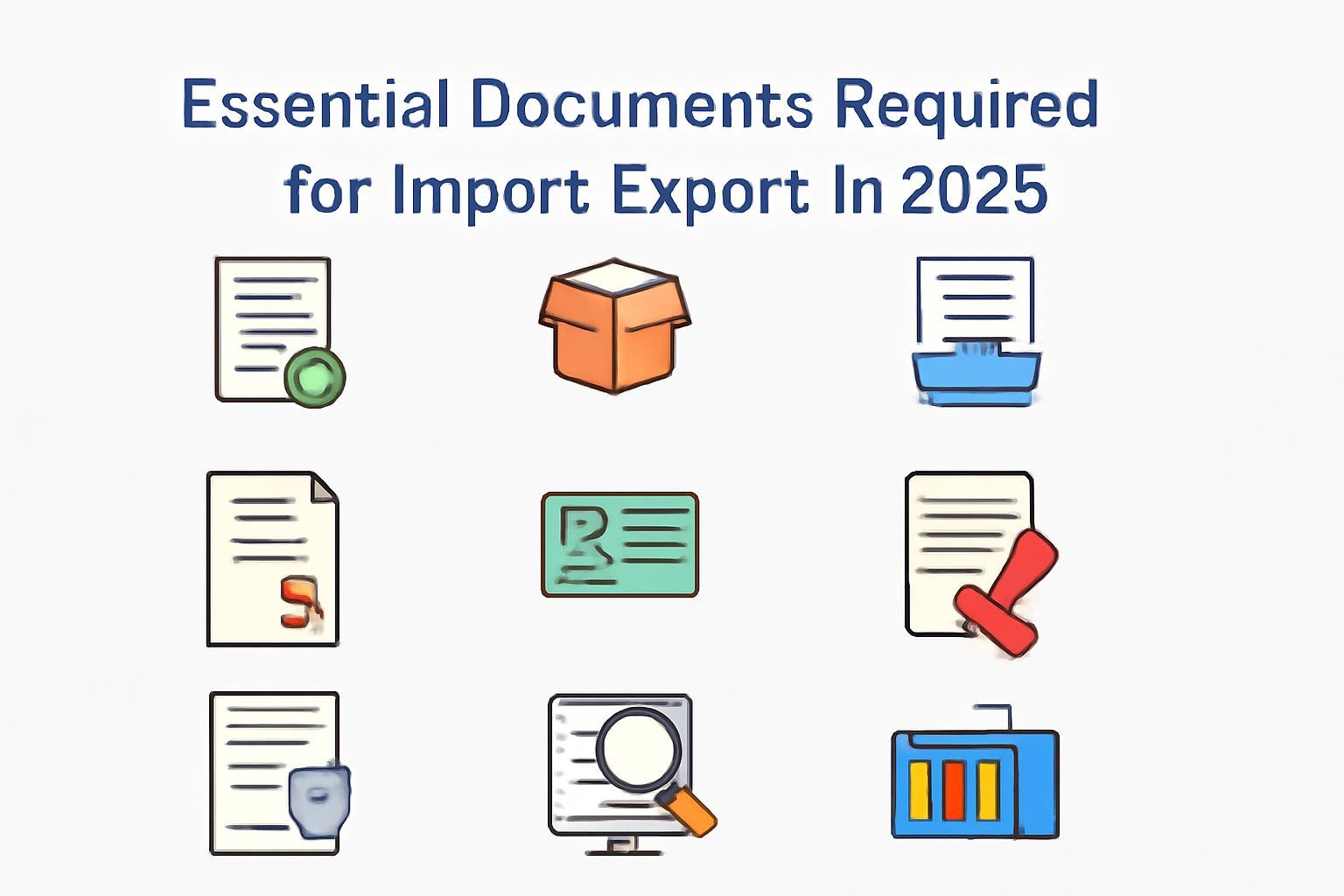
 Thu, 18 Sep 2025
Thu, 18 Sep 2025
Essential Documents Required for Import Export in 2025
Introduction
Entering the world of international trade requires more than just knowledge of the market and logistics—it demands a comprehensive understanding of the essential documents required for import export transactions. In 2025, global trade is more dynamic than ever, and being well-prepared with the right paperwork can save you time, reduce the risk of customs issues, and ensure that your shipments reach their destination smoothly.
In this post, we’ll explore the top documents needed for imports and exports and offer tips to help you stay compliant with both local and international regulations.
1. Commercial Invoice
The Commercial Invoice is the most critical document for any import-export transaction. It serves as the official bill of sale between the buyer and the seller and is used by customs authorities to assess duties and taxes.
Key Details Included:
-
Seller and buyer information (names, addresses)
-
Description of goods (including quantity and price)
-
Terms of sale (Incoterms, payment terms)
-
HS Code (Harmonized System Code for classification)
-
Total value of goods
Pro Tip: Ensure that the description is clear and accurate to avoid delays during customs clearance.
2. Packing List
The Packing List is essential for both the importer and exporter to know what’s inside each package and how it is packed. This list helps shipping companies and customs officials handle the goods appropriately and ensures that there are no discrepancies between what is declared and what’s received.
Key Details Included:
-
Package count
-
Weight of goods
-
Dimensions
-
Description of contents
-
Markings and numbers on the packages
3. Bill of Lading (BOL)
The Bill of Lading serves as the proof of shipment and the receipt of goods. It’s issued by the shipping carrier and signifies that the goods have been loaded onto a specific vessel, aircraft, or truck for transport.
Types of Bills of Lading:
-
Ocean Bill of Lading: For sea freight.
-
Air Waybill: For air freight.
-
Road Bill of Lading: For land transport.
Key Details Included:
-
Shipper and consignee details
-
Route information
-
Description of goods
-
Shipping terms (FOB, CIF, DDP, etc.)
4. Certificate of Origin (COO)
The Certificate of Origin is a declaration of the country where the goods are manufactured or processed. Many countries require this document to determine applicable duties or tariffs.
Why is it Important?
-
It helps qualify goods for preferential tariffs under trade agreements.
-
It verifies the origin of the goods for compliance with local laws.
You can obtain the COO from government-approved agencies, chambers of commerce, or trade associations in the exporting country.
5. Import Export License
An Import Export License is issued by the government or trade authorities in the exporting or importing country and grants permission to engage in international trade.
Types:
-
General License: For companies exporting or importing a wide range of products.
-
Specific License: For businesses engaged in the trade of regulated items, such as firearms or pharmaceuticals.
Key Details Included:
-
License number
-
Exporter or importer's business information
-
List of authorized goods
6. Customs Declaration
The Customs Declaration provides information about the goods being imported/exported, including their classification, origin, and value. Customs authorities use this information to ensure that goods comply with local laws and regulations.
Key Details Included:
-
Description of goods
-
Tariff classification
-
Invoice value
-
Import/export duties and taxes
Pro Tip: Ensure that all information provided in the declaration matches the Commercial Invoice to avoid discrepancies.
7. Insurance Certificate
An Insurance Certificate is a document that proves that the goods being transported are covered against loss, damage, or theft during transit. This certificate is particularly important for high-value shipments or fragile goods.
Key Details Included:
-
Policy number
-
Coverage details
-
Shipment details (value, type of coverage)
8. Inspection Certificate
An Inspection Certificate is often required for goods like food, textiles, or machinery to confirm that they meet safety, quality, or regulatory standards before they can be imported into a country.
When is it Required?
-
Food products (to confirm they meet health standards)
-
Machinery or electronics (to ensure they meet safety and environmental regulations)
9. Export Declaration
An Export Declaration is required in some countries for the export of goods exceeding certain values. This document is used to track and monitor exports and ensure compliance with export control regulations.
10. Import Declaration
Similar to the export declaration, the Import Declaration provides customs authorities with information about the imported goods. It is used to calculate the correct duty and ensure that goods meet the local standards.
Key Details Included:
-
Customs classification
-
Value of goods
-
Place of origin
How to Stay Compliant with Documents in 2025?
In 2025, digitalization is becoming a significant part of international trade, with many documents now being submitted electronically. Some key trends to watch out for include:
-
E-commerce platforms: Automating the creation of documents like invoices and packing lists.
-
Blockchain technology: Ensuring secure and tamper-proof documentation.
Pro Tip: Keep all documents organized digitally to save time, reduce errors, and stay compliant.
Conclusion
In international trade, having the right documents is critical to ensure smooth and efficient customs clearance. Each document serves a unique purpose, from confirming the value and origin of goods to providing proof of shipment and insurance. As you prepare for the complexities of global trade, understanding these essential documents for import export in 2025 will help you avoid delays, reduce risks, and enhance your business operations.
At NaviExports.com, we’re committed to providing you with resources and support to succeed in the world of international trade. Stay updated with our latest insights and guides to streamline your import-export journey.





